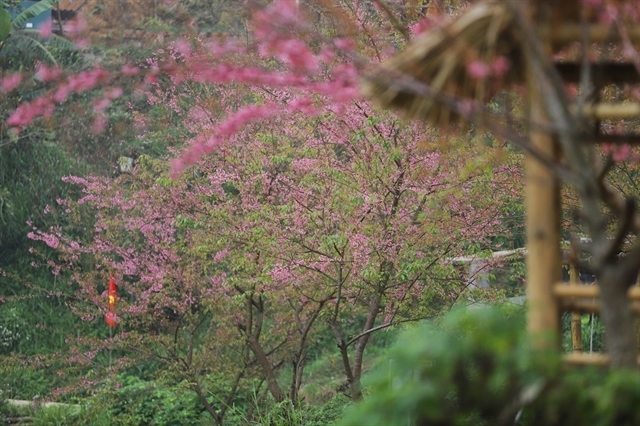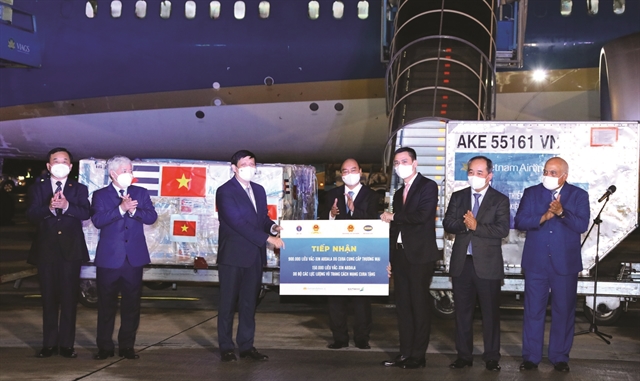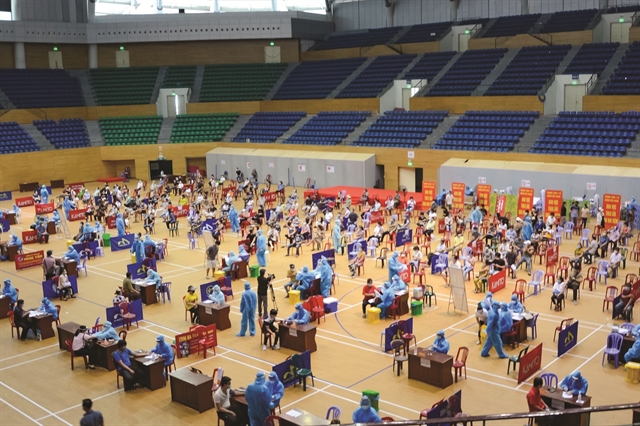 Features
Features

The year 2021 was full of difficulties and challenges for Việt Nam, but the country overcame them with resilience.

|
| VACCINE DIPLOMACY: President Nguyễn Xuân Phúc witnesses the reception of 1 million doses of COVID-19 vaccine and other medical supplies at Nội Bài International Airport on September 25 after his visit to Cuba. VNA/VNS Photo |
Thu Vân
The year 2021 was full of difficulties and challenges for Việt Nam, but the country overcame them with resilience.
Việt Nam had not yet recovered from the heavy consequences caused by two waves of the COVID-19 pandemic in 2020 when it was hit by two more severe waves in 2021.
The fourth wave was the most complicated and dangerous with most deaths recorded. It has spread not only in hospitals, where many people are seriously ill with many underlying diseases but also in the local communities and large industrial zones.
Thousands of community cases have put a massive burden on the whole healthcare system. More than 2 million cases and more than 35,500 deaths have been reported in the country
A major industrial centre in northern Việt Nam, Bắc Giang was the nation's biggest coronavirus hotspot in the fourth wave of the pandemic that emerged last April.
Most of Bắc Giang’s cases were workers in large industrial parks, each of which employ thousands of people from within and outside the province. In July, HCM City became the biggest COVID-19 hotspot in the country, and not long after was put under strict social distancing along with 18 other southern provinces.
Thousands of doctors, nurses and medical students were sent to help HCM City and other southern localities fight the pandemic.
However, with the spirit “Fighting this pandemic is like fighting the enemy”, the Government has acted aggressively yet flexibly, gradually overcoming the consequences caused by the unprecedented health crisis.
Urgent meetings were held, day or night; urgent decisions were issued by the National Assembly and the Government. The ultimate goal was to prevent the spread of the disease and protect the health and life of the people.
In 2021, the Government issued more than 150 resolutions, and more than 80 decrees. The Prime Minister issued more than 30 legal decisions. Ministries and sectors issued more than 250 circulars to remove barriers and free up resources for investment in production, business and pandemic prevention and control.
Guidelines, policies and measures were important factors that helped Việt Nam gradually put the pandemic under control, minimising the negative impact of the pandemic on people's lives.

|
| People in the central city of Đà Nẵng are given the COVID-19 vaccine shots at Tiên Sơn Sports Palace on September 8, 2021. VNA/VNS Photo Văn Dũng |
Biggest vaccination campaign ever
In the relentless efforts to control the pandemic, Việt Nam is well aware that vaccination is a key factor. When the pandemic broke out, the Politburo, the Secretariat of the Party Central Committee and the Government spared no efforts to access vaccines, broadening international cooperation in technology transfer and vaccine production to ensure safe and effective vaccination for the people.
On July 10, 2021 Prime Minister Phạm Minh Chính officially launched the historic nationwide COVID-19 vaccination campaign for all people above the age of 18, making it the largest-ever approach in preventing the pandemic.
At that point, the scarcity of COVID-19 vaccines remained globally. In hundreds of phone calls and meetings with foreign partners and leaders, Vietnamese leaders discussed cooperation on vaccine supply.
The common message conveyed by Vietnamese leaders is that Việt Nam expects other countries to create favourable conditions for access to vaccines as well as technology to produce vaccines.
On August 13, 2021, the Government established a working group on 'vaccine diplomacy' led by Foreign Minister Bùi Thanh Sơn, with the participation of many officials from the ministries of Foreign Affairs, Health, National Defence, Public Security, Industry and Trade, Science and Technology, and the Government Office.
In business trips of the Party and State leaders, vaccine diplomacy was always a top priority.
On his recent visit to Cuba, President Nguyễn Xuân Phúc witnessed a signing ceremony between Vietnamese and Cuban agencies, with Việt Nam ordering 5 million doses of Abdala vaccine from Cuba. One million doses were brought to Việt Nam on a special aircraft that landed at Nội Bài airport on September 25.
During his trip to the US, the Vietnamese President met with more than 30 heads of state, heads of governments of countries and major international organisations. As a result, many partners committed to aid and sell vaccines to the country.
South Korea pledged to deliver more than 1 million doses of vaccine; Hungary committed 400,000 vaccine doses; The US promised to donate a large number of vaccine doses to Việt Nam through COVAX.
During the President's meeting with Pfizer leaders, the corporation committed to delivering 31 million doses of vaccine in 2021 and 20 million doses of vaccine for children when they have full data on the effectiveness and safety of the vaccine.
Prime Minister Chính, head of the National Steering Committee on COVID-19 Prevention and Control, had phone calls with Prime Ministers of nearly 20 countries; sent letters and telegrams to leaders of 22 countries, and had phone calls and sent letters to tens of international organisations to ask for vaccine support.
Almost every week, government leaders held bilateral activities, made dozens of phone calls with foreign leaders, and held meetings with ambassadors of other countries in Việt Nam, as well as with foreign corporations, which focused on vaccine supply.
The efforts paid up.
By early January 2022, Việt Nam had received 206 million doses of vaccine. A total of 103 million doses were purchased with the State budget while the rest were donated from the COVAX Facility and other resources.
The United States is the biggest donor of vaccines to Việt Nam by far with more than 24 million doses.
The European Union is the second-largest donor to COVAX, through which Việt Nam has received more than 9 million doses. Germany is expected to deliver a total of 10 million doses to Việt Nam. Australia committed to sharing 7.8 million doses with the country, of which 2.6 million doses have been delivered. The Japanese Government has donated a total of 3.58 million doses of vaccine since June 2021.
Much more support was mobilised and as of January 12, around 163 million vaccine doses were administered in the country.
Việt Nam has achieved herd immunity against coronavirus with nearly 93.6 per cent of the population aged from 18 having two doses of COVID-19 vaccines; 11.5 per cent were given booster shots; nearly 100 per cent of the 18-year-old and over-18 population have received at least one shot.
For children aged 12-17, 90 per cent are single dosed and 68 per cent double dosed. Work is underway to purchase vaccines for children from 5 to 11 years old.
Việt Nam is one of six countries with the highest COVID-19 vaccination coverage in the world.
Việt Nam’s inoculation campaign, with the door-to-door model, has impressed Dr Takeshi Kasai, the World Health Organization (WHO) Regional Director for the Western Pacific, who said this was the most effective way to elevate vaccine coverage to an even higher degree, to both protect public health and ensure safe conditions for economic growth.
Ending 'Zero COVID'
As infection numbers increased in the fourth wave, Prime Minister Chính signalled in early September last year that the government was considering a shift in policy.
On September 25, Chính said the Government and the COVID-19 Prevention and Control Steering Committee had agreed to change the strategy policy from 'Zero COVID' to 'Safe and flexible adaptation and effective control of the COVID-19 pandemic'.
Later in October, the Government passed Resolution 128 on the adoption of provisional guidelines on safe and flexible living with the coronavius, which was a landmark in Việt Nam’s COVID-19 response as it officially pulled the country out of the 'Zero COVID' strategy.
Previous directives on strict social distancing are no longer valid. Instead, Resolution 128 stipulates how services can be provided and businesses can operate. The country is divided into red, orange, yellow or green zones with connected possibilities and requirements.
As lockdowns lessened, residents were allowed to leave their homes and businesses reopened.
Many said the resolution was a game-changer in the way Việt Nam fought COVID-19 and revitalised the economy.
“It was something people were yearning for after lengthy social distancing period,” said Deputy Minister of Planning and Investment Trần Quốc Phương, who highlighted the positive influence of Resolution 128 on Việt Nam’s economic recovery, saying that because of the resolution, GDP growth bounced back to 5.22 per cent in the final quarter of 2021 after shrinking over 6 per cent in the previous quarter.
“If we have a good and effective virus control model, all social and economic activities and people’s daily life will be able to resume immediately, even strongly,” he said.
Resolution 128 was issued at the appropriate moment, no sooner or later. As soon as the pandemic broke out and the vaccination rate was low, there needed to be solutions to minimise the risk of spreading the disease, reducing the rate of severe cases and deaths. This was when the 'Zero COVID' strategy was appropriate to slow down the infection rate, reduce pressure on the healthcare system and allow more time to vaccinate more people.
Once widespread vaccine coverage had been achieved, a new policy to help the economy recover is what the Government worked out.
“I think the Vietnamese Government has done a very good job and not only that they have done exactly what other responsible governments would have done. I think many other governments have done similar things,” said Thomas Bo Pederson, Mascot Director in Việt Nam.
“Obviously, your Government has decided priority number one is the health of the people. Nothing is beyond or above the health of the people. So that has been the guiding principle for all government actions.”
Welfare packages
To help address the impact of COVID-19 on social security, the National Assembly and Government made various solutions to protect people economically and socially.
On July 1, 2021 the Government released Resolution 68 with a support package worth VNĐ26 trillion from the State budget to support 12 groups of workers and employers, including freelancers.
Reports of labour departments from 63 cities and provinces showed that as of November 25, the total expenses to implement the resolution reached VNĐ28.45 trillion, delivered to 28.27 million subjects, including 377,431 employers, and 27.9 million workers.
On September 24, the Government issued Resolution 116 on launching a support package worth VNĐ38 trillion targeting employers and workers affected by COVID-19, sourced from the unemployment insurance fund. Accordingly, 357,861 employers and 1,868,907 workers received the support.
On October 28, the Việt Nam Labour Federation announced a plan to give financial support to workers to celebrate the Lunar New Year holidays. A budget of VNĐ2.4 trillion was reserved for 8 million labourers (VNĐ300,000 each).
Also in 2021, the Government provided 150,000 tonnes of rice to 2.5 million households affected by hunger, the pandemic and natural disasters.
As the year 2021 came to its end, we waved goodbye to a year of suffering, losses and hardship, a year when the novel coronavirus cast its malignant shadow over the country.
Through all the challenges, Vietnamese people from all walks of life have united to paint a picture of resilience: from medical workers, militia members and volunteers, to Government leaders and the whole political system.
The problems that Việt Nam faced in 2021 are likely to continue into 2022, but with such unity, the nation will recover strongly and rise from the lessons we have learned. The pandemic has given us an unexpected opportunity to think differently about how we work and what we value.
With such resilience shown by the people, Việt Nam is set to prosper in the Year of the Tiger in a spirit of national unity. VNS